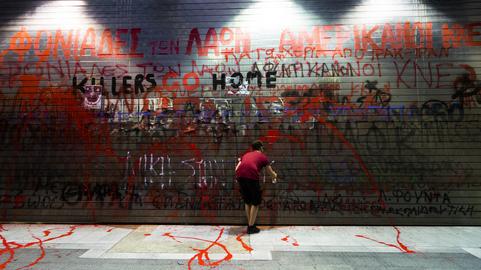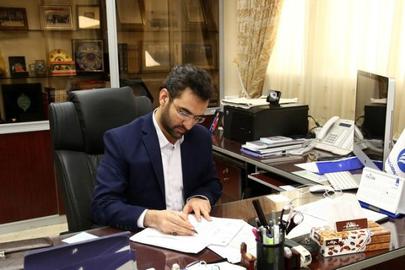Iranian activist Arash Hampay currently lives in Greece, where he has received international protection for the last three years. The founder of the community project Hamyaran-E-Mehrandish Association, he fled Iran after facing increasing threats from the regime and being arrested several times. After the Greek authorities processed his asylum application on the island of Lesbos, he was allowed to go to the Greek mainland and he settled in Athens.
Once in Athens, Hampay immediately got involved in a number of initiatives that support refugees and asylum seekers, including "Our House", a project that provides shelter, food, medicine and other essential support for people outside the system. In addition to his involvement in community projects, Hampay is also an online activist and regularly comments on the living situation for refugees in Greece, which has got him into trouble with people from across the political spectrum.
Since Greece’s conservative New Democracy (ND) party returned to government in July 2019, Hampay and his colleagues have become increasingly aware of the anti-refugee rhetoric and fascist activity in the city, and he often receives threats from these groups of people. Most recently, Hampay posted a comment on Twitter on September 3, and the responses it generated resulted in one political figure being expelled from the ND party.
“Hey fascists. I’m OK in my new country, you can’t choose my movement, I will continue to change my new city fact and atmosphere, our city has to be clean of fascism” [sic], he said in a tweet challenging those who attack him. The comment was quickly picked up, both by people that support Hampay, but also by those who oppose his views.
Only a few moments after he posted, Theodoros Giannaro, a molecular biologist and long-time member of ND who worked on healthcare issues for the party and who regularly comments on Greek politics on Twitter, was one of those who replied. In a now-deleted Tweet he referred to Hampay as “a monkey.”
“You are gonna be kicked back where you came from, you monkey,” he said in the first tweet, and continued attacking Hampay for his ethnicity and political views. Another tweet said: “who is actually the fascist here? Greeks who saved you from downing, gave you food, clothes and a bed to sleep, or maybe you, who instead of closing you mouth and say a simple ‘thank you guys’, you are threatening us, call us fascists & you are ready to ‘clean’ Athens from us?” [sic]
As the exchange between the two continued, Hampay’s initial tweet went viral, and, due to Theodoros Giannaros’ public and political profile, was soon picked up by the media. “It is a very concerning situation to find yourself on the receiving end of constant threats but also a concern for the people who are around you,” Arash Hampay tells Iranwire. “We stay vigilant and not complicit in these attitudes,” he says.
A day after the exchange, ND announced through a press release that Theodoros Giannaros had been expelled from the party and that he had “lost all the rights ... that derive from this position.” When asked about the incident during the government’s daily press conference, its spokesman said: “It is obvious that such comments neither fit the New Democracy party nor the government”. In turn, Arash Hampay commented that he was very impressed that the New Democracy party acted immediately, as it was not the first time that the politician has made these kinds of comments.
Systemic Racism
Comments similar to the one by Theodoros Giannaros are not uncommon, especially on Greek social media and even by prominent political figures. A report by the Greek NGO ANTIGIONE, the Information and Documentation Center on Racism, Ecology, Peace and Non Violence, which analyzed several examples of hate speech by people in the Greek political sphere, found that hate speech in the country is evident across a range of sectors and throughout political different affiliations, transcending class, gender and nationality. In addition, from the 15 examples of hate speech that it examined closely, 12 targeted refugees and migrants.
Following Theodoros Giannaros’ initial tweet, the Racist Crimes Watch, which was created in 2016 and is an initiative of the Greek Helsinki Monitor, sued Giannaros for hate speech based on Greece’s anti-racist law.
“The lawsuit against Theodoros Giannaros is the 568th complaint that we have filed for racist crimes. Calling a refugee ‘a monkey’ is classic racism. In any other serious country the justice system and the state, instead of hiding or reproducing racism as in happens in Greece, they persecute it, even when an athlete or a sportsman says it or mimics the sound of a monkey,” says Panayote Dimitras, spokesperson for the Greek Helsinki Monitor.
According to a report published by the Racist Violence Reporting Network, which looks at racist violence in Greece, in 2018 there were 117 incidents or reports of racist crimes, 74 of which were against refugees and migrants or support networks and human right defenders. Victims of these crimes include people who were directly affected by the organized attack against refugees who protested peacefully in the center of Mytilene on the islands of Lesbos, which is known for having high numbers of refugees arriving from Turkey. Those who participated in the attack included members of extreme right wing groups, members or supporters of the Greek neo-Nazi political party Golden Dawn, as well as residents of the island active in local politics.
Racist and hate speech, as well as racist crimes in Greece, are persecuted under Law 4285/2014, more commonly known as the Anti-racist Bill, which was the result of amendments to previous laws regarding racist crimes. Although the Anti-racist Bill expanded the spectrum of crimes that can be brought to justice, including hate speech, it can still be problematic when one considers how deeply embedded racism is in Greek society.
“The anti-racist law may work dissuasively, but this does not apply to reality, as probably the majority of judges and public persecutors are racists,” Panayote Dimitras tells Iranwire.
According to Panayiote Dimitras, the refugee crisis might have played a role in the increase of hate speech and racist crimes. However, hate crimes against the LGBT community or religious and ethnic minorities in the country are also rife. In addition, Dimitras supports the idea that the rise in racist crimes against refugees and migrants is mainly due to the Greek reception system, which caused several serious issues in small communities. “However,” he says, “this rise is due to a pre-existing subconscious racism that was ‘freed’ because of the refugee crisis.”
The expulsion of Theodoros Giannaros from New Democracy was a positive step for the conservative party, which has been widely criticized in the past for its members’ negative, and in many cases, racist, stance toward refugees and migrants. However, it would not have happened if there had not been pressure from the media. Despite the fact that Theodoros Giannaros apologized to his party for what he said, he went on to attack Arash Hampay again — prompting several people to defend Giannaros, and leading to a wave of racist attacks against Hampay and his followers.
*IranWire contacted Theodoros Giannaros for comment but had not received a reply at the time of publishing
Marianna Karakoulaki is a journalist and researcher working in the UK and Greece
visit the accountability section
In this section of Iran Wire, you can contact the officials and launch your campaign for various problems





























comments